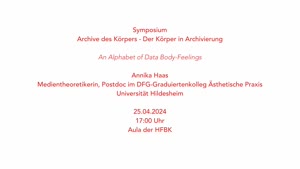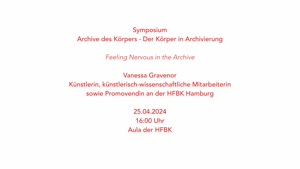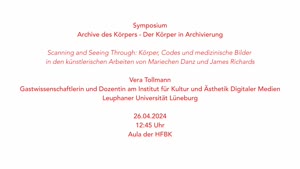An Alphabet of Data Body-Feelings - Annika Haas - Annika Haas - HFBK
- MEDIATHEK
- Alle Videos
- HFBK
- Alle Bereiche
- Archives of the Body - The Body in Archiving
Alle Videos
An Alphabet of Data Body-Feelings - Annika Haas
Data bodies are “discrete parts of our whole selves that are collected, stored in databases,“ according to the collective Our Data Bodies. Yet, our data bodies do not belong to us. In the age of “surveillance capitalism” (Shoshana Zuboff) the tracking, analysis, sale, and archiving of user data happens widely unnoticed. Inspired by the film The Alphabet of Feeling Bad (Ann Cvetkovich and Karin Michalski, 2012) as well as Joana Moll’s artistic work and investigations I revisit negative feelings related to the opaque infrastructures underlying the uncanny excess and growth of data bodies and look into our non-sovereign relation to the accumulation of user data for advertising purposes and other third-party interests. Is ’data body’ a useful metaphor to explore and analyse these feelings, their underlying (body) politics as well as the archival and material infrastructures they are connected to?
Annika Haas is a media theorist and critic based in Berlin and a Postdoctoral Fellow in the Research Training Group Aesthetic Practice at the University of Hildesheim. Previously, she was a Research Associate at the Berlin University of the Arts (2017–2023). In 2022, she completed her PhD with a thesis on Hélène Cixous’s philosophy and writing through the body: Avant-Theorie. Hélène Cixous’ écriture du corps. Her research interests include French philosophy, theory as an aesthetic practice, and, more recently, aesthetics beyond repair in response to the damages caused by digital capitalism and its infrastructures.
Moderation: Rea Alp, Kunstwissenschaftlerin und Kunsthistorikerin, Promovendin an der HFBK Hamburg
---
Im Blick auf den menschlichen Körper ist die Ordnungsform ‚Archiv‘ als das techno-mediale Arsenal zu verstehen, das Körper und Subjekte historisch geformt hat und weiterhin Identitäten, Handlungsweisen, Machtverhältnisse und Gemeinschaften gestaltet. Das ‚Archiv‘ funktioniert als epistemologisches Regime. Es besteht aus Repräsentationssystemen, Diskursen, Institutionen, Konventionen, Praktiken und kulturellen Vereinbarungen. Es bestimmt, welche Körper, Geschlechter und Sexualitäten sichtbar werden und welche nicht, welche kulturell, sozial und ökonomisch zählen und welche als nutzlos gelten. Denn Körper sind nicht einfach gegeben, sondern werden durch Prozesse der Beschreibung, Abformung, Modellierung, Nach- und Abbildung hervorgebracht. In den fünf Kapiteln Körper im Kontext, Medizinische Körper, Datenkörper, Narrative vom Psychischen und Verletzliche Körper werden historische Archivbezüge aktualisiert und die gesellschaftlichen und kulturellen Subjektivierungsweisen durch solche Datensammlungen, ihre Auswirkungen auf das Persönliche und das Politische theoretisch und ästhetisch untersucht: Kritische Analyse trifft auf Formen des Widerständigen.
Mit einem Symposium, einer Ausstellung, einem Filmprogramm mit Recherchematerial zum begehrenden und sexuellen Körper sowie einer umfassenden digitalen Publikation in Zusammenarbeit mit der Klasse Digitale Grafik der HFBK Hamburg.









